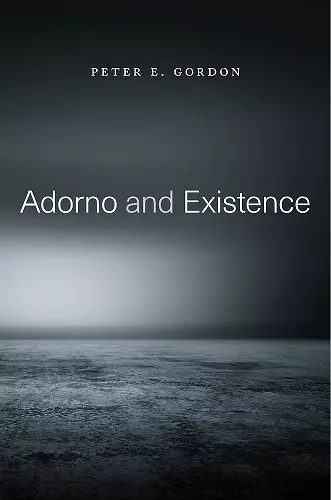Adorno and Existence
Format:Paperback
Publisher:Harvard University Press
Published:31st Aug '18
Should be back in stock very soon

From the beginning to the end of his career, the philosopher Theodor W. Adorno sustained an uneasy but enduring bond with existentialism. His attitude overall was that of unsparing criticism, verging on polemic. In Kierkegaard he saw an early paragon for the late flowering of bourgeois solipsism; in Heidegger, an impresario for a “jargon of authenticity” cloaking its idealism in an aura of pseudo-concreteness and neo-romantic kitsch. Even in the straitened rationalism of Husserl’s phenomenology Adorno saw a vain attempt to break free from the prison-house of consciousness.
“Gordon, in a detailed, sensitive, fair-minded way, leads the reader through Adorno’s various, usually quite vigorous, rhetorically pointed attacks on both transcendental and existential phenomenology from 1930 on…[A] singularly illuminating study.”
—Robert Pippin, Critical Inquiry
“Gordon’s book offers a significant contribution to our understanding of Adorno’s thought. He writes with expertise, authority, and compendious scholarship, moving with confidence across the thinkers he examines…After this book, it will not be possible to explain Adorno’s philosophical development without serious consideration of [Gordon’s] reactions to them.”
—Richard Westerman, Symposium
This extraordinary study is a marvelous interpretation of the whole of Adorno’s philosophical thinking by making convincingly clear to what surprising degree it is dependent on some constitutive ideas of Kierkegaard. Gordon successfully integrates two aims, the systematic re-interpretation of Adorno’s philosophy and the subtle reconstruction of his intellectual development. This is a tour de force for which Peter Gordon deserves highest admiration. -- Axel Honneth, Goethe University Frankfurt and Columbia University
Adorno and Existence struck me as almost inevitable: how is it that no one had thought to write this necessary book previously? With a rare combination of narrative brio and analytic insight, Peter Gordon tracks Adorno’s repeated confrontations with Kierkegaard, Husserl, Heidegger, Kafka, & co. This is a fine, even irreplaceable study with a superb and riveting final chapter. -- Jay Bernstein, The New School
On first reading Adorno’s early study of Kierkegaard, Walter Benjamin intuited that it was ‘very possible that the author’s later books will spring from this one.’ When Adorno reissued it many years later, he admitted to Ernst Bloch that it had ‘the character of a dream-like anticipation.’ With Peter Gordon’s arresting new interpretation of Adorno’s life-long struggle with Kierkegaard’s legacy, a struggle generating the dynamic force field of theology, aesthetics and social critique he called negative dialectics, we can understand for the first time how right both of these observations actually were. -- Martin Jay, University of California, Berkeley
Written with elegance and meticulously researched, the book focuses on Adorno’s successive encounters with Kierkegaard, Husserl, and Heidegger over the years as a key to unlock Adorno’s own difficult thinking. A major contribution to Adorno studies and beyond. -- Seyla Benhabib, Yale University
A perceptive philosophical inquiry. -- Samuel Freeman * New York Review of Books *
Gordon, in a detailed, sensitive, fair-minded way, leads the reader through Adorno’s various, usually quite vigorous, rhetorically pointed attacks on both transcendental and existential phenomenology from 1930 on…[A] singularly illuminating study. -- Robert Pippin * Critical Inquiry *
Adorno and Existence is an expansive and ambitious undertaking and Gordon deserves praise for elucidating the dense constructions of Adorno’s texts, especially in the often elliptical prose of Negative Dialectics. He traces a constant concern in Adorno, from the 1930s onwards, to associate the ontology of existentialism with idealism while also acknowledging an underlying value in idealism’s resistance to the merely given…[An] elegantly composed study. -- Sean Sheehan * Marx and Philosophy Review of Books *
Gordon’s book offers a significant contribution to our understanding of Adorno’s thought. He writes with expertise, authority, and compendious scholarship, moving with confidence across the thinkers he examines. Throughout his argument, he effectively places Adorno’s work in the context of contemporary debates and events. His well-organized exposition and lucid prose are particularly noteworthy, conveying complex ideas with clarity and nuance. Above all, I found myself persuaded of his central claim, as it seems quite clear that Adorno’s engagement with the thought of Kierkegaard, Husserl, and Heidegger played a decisive role in the development of his own philosophy, rather than entailing merely a straightforward rejection. After this book, it will not be possible to explain Adorno’s philosophical development without serious consideration of his reactions to them. -- Richard Westerman * Symposium *
Gordon masterfully reconstructs Adorno's lifelong engagement with existentialist thinkers and themes…The lucid and concise way in which he writes about Adorno is no less than exemplary…The book brilliantly succeeds in its aims. It indicates the path for a further exploration of the hidden affinities between one of the main theorists of the Frankfurt school and existential philosophy. -- Helmer Stoel * Universa Recensioni di Filosofia *
ISBN: 9780674986862
Dimensions: unknown
Weight: unknown
272 pages